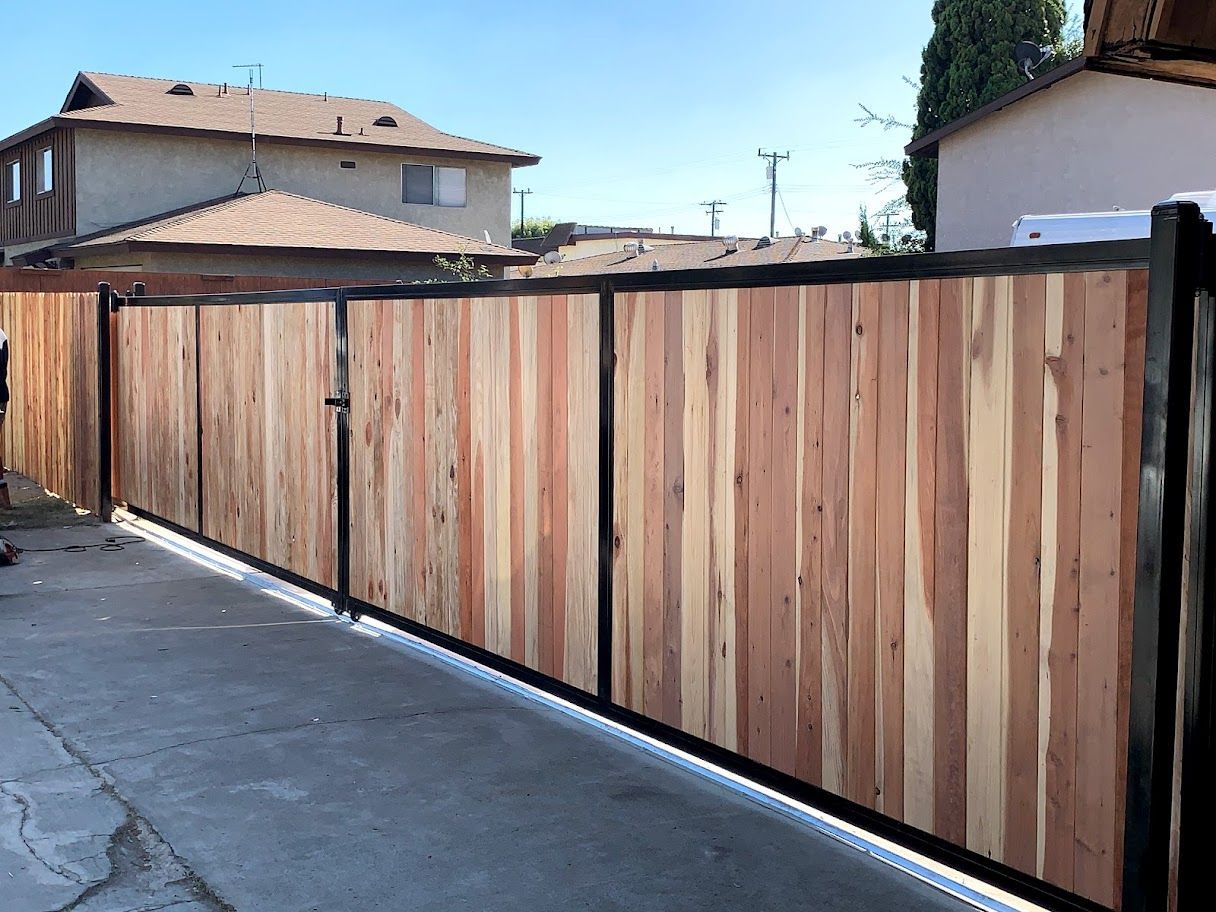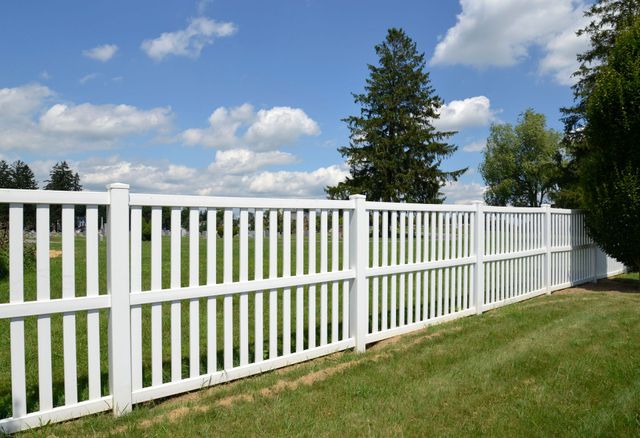All Categories
Featured
When selecting a fencing for your building, it's necessary to take into consideration factors like expense, sturdiness, maintenance, and visual allure. 3 of one of the most preferred materials for household and commercial fencings are aluminum, timber, and plastic. Each offers unique benefits and some downsides, making it crucial to review your requirements before deciding. Below, we compare the pros and disadvantages of these products to help lead your selection.
Wood Fencing. Pros:
![]()
All-natural Visual: Timber fencings are recognized for their timeless, natural appearance. They can easily blend right into the majority of landscapes and improve the charm of your home or organization. Whether you're aiming for a rustic appearance or a much more sleek coating, timber can be personalized with paint, tarnish, or sealer. Personalization: Timber is one of the most functional products, permitting a wide array of designs, such as picket fences, privacy fences, and ranch-style rooms. It's simple to change the style to fit the certain needs of your property. Inexpensive: Normally, timber fencings come at a lower initial price compared to vinyl or light weight aluminum, making them an economical choice for those on a budget. Disadvantages:
Maintenance Needs: Timber fencings require routine upkeep to preserve their elegance and capability. This consists of staining or paint to secure versus rot, termites, and climate damages. Without correct care, timber can weaken over time. Much Shorter Life Expectancy: Compared to plastic or aluminum, wood fencings tend to have a much shorter lifespan, especially in areas with severe climate. Harsh conditions, such as hefty rain, moisture, or snow, can create wood to deteriorate quicker. Prone to Damages: Timber fencings are susceptible to harm from insects, including termites, in addition to natural wear from weather. They might also warp or fracture otherwise properly kept. Vinyl Secure fencing. Pros:
Low Upkeep: One of the main benefits of vinyl fences is that they require marginal maintenance. Unlike timber, plastic doesn't need to be repainted, sealed, or tarnished. It's immune to fading, discoloration, and cracking, which saves money and time on upkeep. Toughness: Plastic is recognized for its ability to withstand extreme climate condition without deteriorating. It's unsusceptible parasites like termites, and its resistance to moisture and UV rays guarantees it remains looking helpful for several years. Lasting: A vinyl fence can last as much as three decades or more, making it a terrific long-term financial investment. Numerous suppliers provide guarantees, additionally enhancing its value. Selection of Styles: Vinyl fences are offered in different shades and designs, consisting of those that imitate timber. You can pick from privacy, picket, or decorative styles, offering versatility to match your home or organization. Cons:
![]()
Higher Upfront Cost: Plastic fences tend to have a higher preliminary cost than wood. While the long-term cost savings on upkeep are significant, the upfront financial investment might be a deterrent for some property owners. Minimal Personalization: Vinyl fences can be found in basic designs, and while colors and styles are diverse, you might not have as much versatility for personalization compared to timber. Cracking in Cold Climates: While plastic is resilient, in extremely chilly environments, it can end up being breakable and fracture upon impact, which can be problematic in locations with harsh winter seasons. Light weight aluminum Secure fencing. Pros:
Low Maintenance: Light weight aluminum fences are understood for their low-maintenance needs. Unlike wood, light weight aluminum does not corrosion or corrode, and it does not need to be repainted or secured. This makes it a fantastic selection for those that want a hassle-free choice. Longevity and Stamina: Light weight aluminum is a durable product that stands up well to rough weather condition problems. It's an outstanding option for coastal locations where deep sea corrosion is a concern, as it's immune to corrosion. Visual Charm: Aluminum fencings supply a tidy, elegant appearance, often utilized for ornamental objectives. They're available in various designs, consisting of ornamental designs, and can include a high-end feeling to your residential or commercial property. Security: Light weight aluminum fences are resilient and offer excellent safety, specifically when installed with gates or locks. Their strong building and construction provides a trusted obstacle versus undesirable entrance. Cons:
![]()
Higher Initial Expense: Light weight aluminum fencings often tend to be extra pricey than wood, particularly if you choose for ornamental designs. The upfront cost might be prohibitive for some. Less Personal privacy: Aluminum fencings commonly have bigger spaces in between the slats, which implies they give much less privacy than timber or plastic fences. Light weight aluminum may not be the ideal alternative if seclusion is a priority. Denting Problems: While light weight aluminum is rust-resistant, it is at risk to bending or denting if struck with force. As an example, a car mishap or hefty effect can create long-term damage to the fence. Which Fence Product is Right for You? Choosing the appropriate fencing relies on several aspects, including your budget, style choices, upkeep capacity, and the setting in which you live. If you desire an all-natural appearance and are prepared for normal upkeep, timber could be the right option. If low-maintenance and durability are your top priorities, plastic is an excellent option. For those who like a streamlined, modern-day look with very little treatment, light weight aluminum supplies a long-lasting, safe remedy.
Ultimately, each fencing product has its cons and pros, so it is essential to examine what matters most for your details demands. Think about the climate, the degree of personal privacy you require, and just how much upkeep you agree to devote to, and you'll discover the best fencing for your property.
Wood Fencing. Pros:

All-natural Visual: Timber fencings are recognized for their timeless, natural appearance. They can easily blend right into the majority of landscapes and improve the charm of your home or organization. Whether you're aiming for a rustic appearance or a much more sleek coating, timber can be personalized with paint, tarnish, or sealer. Personalization: Timber is one of the most functional products, permitting a wide array of designs, such as picket fences, privacy fences, and ranch-style rooms. It's simple to change the style to fit the certain needs of your property. Inexpensive: Normally, timber fencings come at a lower initial price compared to vinyl or light weight aluminum, making them an economical choice for those on a budget. Disadvantages:
Maintenance Needs: Timber fencings require routine upkeep to preserve their elegance and capability. This consists of staining or paint to secure versus rot, termites, and climate damages. Without correct care, timber can weaken over time. Much Shorter Life Expectancy: Compared to plastic or aluminum, wood fencings tend to have a much shorter lifespan, especially in areas with severe climate. Harsh conditions, such as hefty rain, moisture, or snow, can create wood to deteriorate quicker. Prone to Damages: Timber fencings are susceptible to harm from insects, including termites, in addition to natural wear from weather. They might also warp or fracture otherwise properly kept. Vinyl Secure fencing. Pros:
Low Upkeep: One of the main benefits of vinyl fences is that they require marginal maintenance. Unlike timber, plastic doesn't need to be repainted, sealed, or tarnished. It's immune to fading, discoloration, and cracking, which saves money and time on upkeep. Toughness: Plastic is recognized for its ability to withstand extreme climate condition without deteriorating. It's unsusceptible parasites like termites, and its resistance to moisture and UV rays guarantees it remains looking helpful for several years. Lasting: A vinyl fence can last as much as three decades or more, making it a terrific long-term financial investment. Numerous suppliers provide guarantees, additionally enhancing its value. Selection of Styles: Vinyl fences are offered in different shades and designs, consisting of those that imitate timber. You can pick from privacy, picket, or decorative styles, offering versatility to match your home or organization. Cons:

Higher Upfront Cost: Plastic fences tend to have a higher preliminary cost than wood. While the long-term cost savings on upkeep are significant, the upfront financial investment might be a deterrent for some property owners. Minimal Personalization: Vinyl fences can be found in basic designs, and while colors and styles are diverse, you might not have as much versatility for personalization compared to timber. Cracking in Cold Climates: While plastic is resilient, in extremely chilly environments, it can end up being breakable and fracture upon impact, which can be problematic in locations with harsh winter seasons. Light weight aluminum Secure fencing. Pros:
Low Maintenance: Light weight aluminum fences are understood for their low-maintenance needs. Unlike wood, light weight aluminum does not corrosion or corrode, and it does not need to be repainted or secured. This makes it a fantastic selection for those that want a hassle-free choice. Longevity and Stamina: Light weight aluminum is a durable product that stands up well to rough weather condition problems. It's an outstanding option for coastal locations where deep sea corrosion is a concern, as it's immune to corrosion. Visual Charm: Aluminum fencings supply a tidy, elegant appearance, often utilized for ornamental objectives. They're available in various designs, consisting of ornamental designs, and can include a high-end feeling to your residential or commercial property. Security: Light weight aluminum fences are resilient and offer excellent safety, specifically when installed with gates or locks. Their strong building and construction provides a trusted obstacle versus undesirable entrance. Cons:

Higher Initial Expense: Light weight aluminum fencings often tend to be extra pricey than wood, particularly if you choose for ornamental designs. The upfront cost might be prohibitive for some. Less Personal privacy: Aluminum fencings commonly have bigger spaces in between the slats, which implies they give much less privacy than timber or plastic fences. Light weight aluminum may not be the ideal alternative if seclusion is a priority. Denting Problems: While light weight aluminum is rust-resistant, it is at risk to bending or denting if struck with force. As an example, a car mishap or hefty effect can create long-term damage to the fence. Which Fence Product is Right for You? Choosing the appropriate fencing relies on several aspects, including your budget, style choices, upkeep capacity, and the setting in which you live. If you desire an all-natural appearance and are prepared for normal upkeep, timber could be the right option. If low-maintenance and durability are your top priorities, plastic is an excellent option. For those who like a streamlined, modern-day look with very little treatment, light weight aluminum supplies a long-lasting, safe remedy.
Ultimately, each fencing product has its cons and pros, so it is essential to examine what matters most for your details demands. Think about the climate, the degree of personal privacy you require, and just how much upkeep you agree to devote to, and you'll discover the best fencing for your property.
Latest Posts
Maximize Your Savings with Love My Credit Score Union Incentives
Published Apr 21, 25
1 min read
Discover the Top Eye Specialists for Cataracts at the Eye Center South
Published Apr 21, 25
1 min read
Tiki Bar: A Taste of the Tropics
Published Apr 21, 25
1 min read